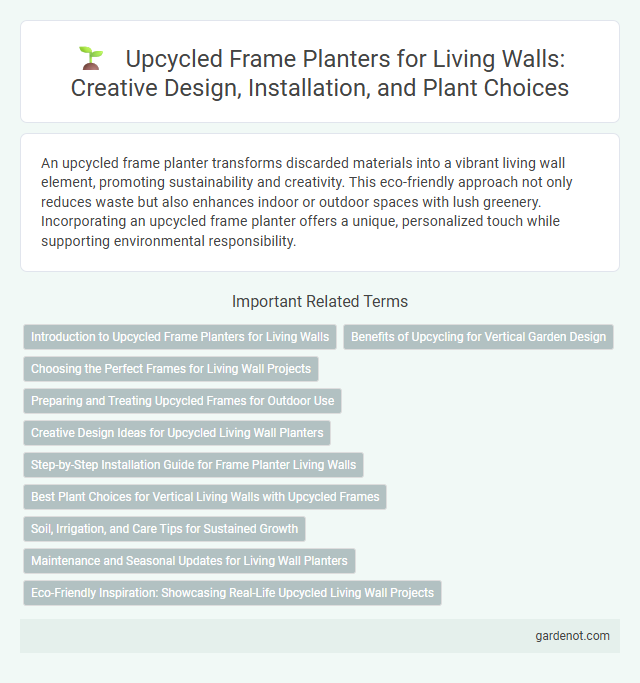An upcycled frame planter transforms discarded materials into a vibrant living wall element, promoting sustainability and creativity. This eco-friendly approach not only reduces waste but also enhances indoor or outdoor spaces with lush greenery. Incorporating an upcycled frame planter offers a unique, personalized touch while supporting environmental responsibility.
Introduction to Upcycled Frame Planters for Living Walls
Upcycled frame planters revolutionize living walls by transforming discarded materials into sustainable, eco-friendly structures that support vertical gardening. These planters maximize space efficiency and promote biodiversity while reducing waste through creative repurposing of wood, metal, or plastic frames. Their customizable design and environmental benefits make upcycled frame planters a popular choice for urban green spaces and indoor garden installations.
Benefits of Upcycling for Vertical Garden Design
Upcycled frame planters enhance vertical garden design by reducing waste and promoting sustainability through the reuse of materials like wood, metal, and plastic. These eco-friendly planters provide unique aesthetic appeal and durability, contributing to a dynamic living wall while minimizing environmental impact. Integrating upcycled elements supports circular economy principles and fosters creativity in green architecture.
Choosing the Perfect Frames for Living Wall Projects
Selecting the ideal upcycled frames for living wall projects involves prioritizing durable, weather-resistant materials such as reclaimed wood, metal, or sturdy plastics. Frames with adequate depth and drainage capabilities ensure optimal root growth and prevent water accumulation, promoting healthy plant development. Incorporating unique textures and varied sizes enhances visual interest while supporting sustainable landscaping goals.
Preparing and Treating Upcycled Frames for Outdoor Use
Preparing upcycled frames for outdoor use involves thoroughly cleaning and sanding the surface to remove dirt and old paint, ensuring proper adhesion of protective coatings. Applying a weather-resistant sealant, such as marine varnish or outdoor polyurethane, safeguards the wood from moisture, UV rays, and temperature fluctuations. Elevating drainage with drilled holes and adding a water-resistant liner extends the planter's durability and prevents root rot in living wall installations.
Creative Design Ideas for Upcycled Living Wall Planters
Upcycled frame planters transform discarded materials into unique living wall structures that blend sustainability with artistic expression. Incorporating reclaimed wood, vintage window frames, or metal grids as planter bases enhances visual texture and supports diverse plant species suited for vertical growth. Creative arrangements combining succulents, ferns, and air plants optimize air purification and aesthetic appeal in limited indoor or outdoor spaces.
Step-by-Step Installation Guide for Frame Planter Living Walls
Secure the upcycled frame planter to a sturdy wall using heavy-duty anchors suitable for the wall material, ensuring even weight distribution. Mount a waterproof backing inside the frame before adding a high-quality, breathable planting medium to promote healthy root growth. Finally, plant a variety of drought-tolerant species, water thoroughly, and install a drip irrigation system to maintain consistent moisture levels for the living wall.
Best Plant Choices for Vertical Living Walls with Upcycled Frames
Succulents, ferns, and air plants thrive best in vertical living walls featuring upcycled frame planters due to their low water requirements and adaptability to limited soil depth. Hardy herbs like thyme, oregano, and mint also perform well, adding both greenery and fragrance to upcycled vertical displays. Selecting drought-tolerant varieties ensures longevity and minimal maintenance for sustainable living wall installations.
Soil, Irrigation, and Care Tips for Sustained Growth
Upcycled frame planters provide a sustainable foundation for living walls by incorporating nutrient-rich, well-draining soil blends that support root health and moisture retention. Efficient irrigation systems, such as drip or wick irrigation, ensure consistent water delivery while preventing overwatering and root rot. Regular care involves monitoring soil moisture levels, pruning to encourage growth, and applying organic fertilizers to maintain vigorous plant development.
Maintenance and Seasonal Updates for Living Wall Planters
Upcycled frame planters for living walls require regular maintenance, including watering, pruning, and monitoring for pests to ensure vibrant, healthy plants. Seasonal updates involve replacing annuals, refreshing soil nutrients, and adjusting irrigation schedules to accommodate changing weather conditions. Proper care extends the lifespan of the upcycled planter while maintaining its aesthetic appeal and ecological benefits.
Eco-Friendly Inspiration: Showcasing Real-Life Upcycled Living Wall Projects
Upcycled frame planters transform reclaimed materials into stunning living walls that enhance sustainability and reduce waste. Real-life projects demonstrate how discarded wood, metal, and plastic can be repurposed into vibrant, eco-friendly vertical gardens promoting biodiversity and air purification. These innovative designs inspire urban dwellers and gardeners to adopt green practices by integrating nature into limited spaces while supporting environmental conservation.
Upcycled frame planter Infographic

 gardenot.com
gardenot.com